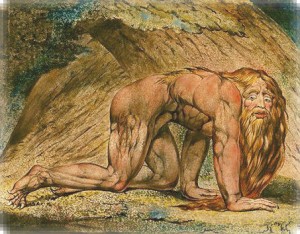
Whenever we talk about the word “proud”, other words that are used as synonyms come to mind, such as vain, haughty, arrongant, among others. The Real Academia Española dictionary (www.rae.es) defines the word “pride” in several ways:
- Haughtiness and disorderly desire to be preferred over others.
- Satisfaction and self-importance from the contemplation of one’s own qualities with contempt for others.
- Anger and wrath expressed with unruly actions or haughty and injurious words.
In the world, it seems that those who are vain and haughty succeed in everything, even in the word of God we find that from ancient times this was thought to be so.
“So now we call the proud blessed, for those who do wickedness are raised up; they even tempt God and go free.’” Malachi 3:15
However, in the Word, there are several cases of proud people, and none of them end well unless they change their character. In this study, we will focus on two important kings of their time, King Nebuchadnezzar and King Uzziah, although we will also mention others.
THE KING NEBUCHADNEZZAR
The case of King Nebuchadnezzar is very special in the Bible. He was a useful instrument of God to punish the people of Israel:
“Behold, I will send and take all the families of the north,” says the Lord, “and Nebuchadnezzar the king of Babylon, My servant, and will bring them against this land, against its inhabitants, and against these nations all around, and will utterly destroy them, and make them an astonishment, a hissing, and perpetual desolations.” Jeremiah 25:9
In the book of Jeremiah, he again calls King Nebuchadnezzar “my servant,” which indicates that he is an instrument of God, and also that all the authority the king had over his empire came from God.
“And now I have given all these lands into the hand of Nebuchadnezzar the king of Babylon, My servant; and the beasts of the field I have also given him to serve him.” Jeremiah 27:6.
Not only was King Nebuchadnezzar going to have authority over the people of Israel, but God also gave him authority over other nations.
“Therefore thus says the Lord God: ‘Surely I will give the land of Egypt to Nebuchadnezzar king of Babylon; he shall take away her wealth, carry off her spoil, and remove her pillage; and that will be the wages for his army.‘” Ezekiel 29:19
In the book of Daniel, Nebuchadnezzar recounts in the first person the experience he had with God, how God showed him through a dream what He was going to do with him, using the prophet Daniel to change his ways. All of this is found in Daniel 4 [Nebuchadnezzar’s madness].
Both the purpose of the dream and the message that this biblical passage teaches us are summarized in the following verse:
“The decision is by the decree of the watchers, and the sentence by the word of the holy ones, in order that the living may know that the Most High rules in the kingdom of men, gives it to whomever He will, and sets over it the lowest of men.” Daniel 4:17.

This verse is repeated three additional times in Daniel 4:25, 4:32, and 5:21, which indicates that it is a firm position and desire of God, that all human beings know that “the Most High rules in the kingdom of men.”
God gave King Nebuchadnezzar plenty of time to amend his ways, but he did not. God waited for an act of pride from the king, and then the kingdom was taken away from him as he dreamed and as the prophet Daniel explained to him.
God gave King Nebuchadnezzar plenty of time to amend his ways, but he did not. God waited for an act of pride from the king, and then the kingdom was taken away from him as he dreamed and as the prophet Daniel explained to him.
“The king spoke, saying, ‘Is not this great Babylon, that I have built for a royal dwelling by my mighty power and for the honor of my majesty?’ While the word was still in the king’s mouth, a voice fell from heaven: ‘King Nebuchadnezzar, to you it is spoken: the kingdom has departed from you.’” Daniel 4:30-31
The Lord had to afflict him with an illness, take away his kingdom, and make him pass “seven times.” At the end of that period, which could have been seven years, the king finally acknowledged God.
“Now I, Nebuchadnezzar, praise and extol and honor the King of heaven, all of whose works are truth, and His ways justice. And those who walk in pride He is able to put down.” Daniel 4:37
THE ACT OF PRIDE OF KING UZZIAH
Another relevant biblical passage is that of King Uzziah. This king was greatly prospered because in his early days he sought after God.
“And he sought God in the days of Zechariah, who had understanding in the visions of God; and as long as he sought the Lord, God made him prosper.” 2 Chronicles 26:5.
God made him grow and prosper greatly as a king, but such greatness got to his head as it happens with many people. He became a prideful person.
“And he made in Jerusalem engines, invented by skillful men, to be on the towers and the corners, to shoot arrows and great stones. And his fame spread far, for he was marvelously helped, till he was strong. But when he was strong, his heart was lifted up to his destruction, for he transgressed against the Lord his God by entering the temple of the Lord to burn incense on the altar of incense.” 2 Chronicles 26:15-16.
Only the Levites were allowed to do that, and he was interrupted in his attempt by the high priest Azariah and 80 priests. However, instead of taking the admonition constructively, he had a very proud attitude.
“Then Uzziah became furious, and he had a censer in his hand to burn incense. And while he was angry with the priests, leprosy broke out on his forehead in the presence of the priests in the house of the Lord, by the altar of incense.” 2 Chronicles 26:19
God also took away his kingdom with an illness. After that, the Word does not indicate that he repented or changed his attitude unlike King Nebuchadnezzar.
The Bible is very clear on how God treats the haughty and prideful. In the book of Proverbs, we find all these verses:
“The Lord will destroy the house of the proud, but he will establish the boundary of the widow.” Proverbs 15:25
“Everyone who is arrogant in heart is an abomination to the Lord; be assured, he will not go unpunished.” Proverbs 16:5
“Pride goes before destruction, and a haughty spirit before a fall.” Proverbs 16:18
“An arrogant man stirs up strife, but he who trusts in the Lord will prosper.” Proverbs 28:25
“There are those whose eyes are haughty, whose glances are wanton.” Proverbs 30:13
“Scoffer is the name of the arrogant, haughty man who acts with arrogant pride.” Proverbs 21:24
“I will not look with favor on anyone who has a haughty look and an arrogant heart.” Psalms 101:5
WE MUST SEEK HUMILITY
The Lord wants us to be humble. The word humility has various meanings, but the Word of God mostly gives it this meaning when used:
Humility: A virtue consisting in the knowledge of one’s own limitations and weaknesses and in acting accordingly. (www.rae.es) That is, humble is the opposite of prideful and haughty. Therefore, the Bible invites us to be humble and associate with them, not with the proud and haughty.
“For though the Lord is high, he regards the lowly, but the haughty he knows from afar.” Psalms 138:6
“But he gives more grace. Therefore it says, ‘God opposes the proud but gives grace to the humble.‘” James 4:6
“Live in harmony with one another. Do not be haughty, but associate with the lowly. Never be wise in your own sight.” Romans 12:16
CONCLUSION
Make an examination of conscience and think about the traits that identify you as a person. If you recognize that you are a prideful person and want to change your life, we invite you to receive God in your heart, as only Jesus Christ can make you a new person. Visit our page KNOW CHRIST.
